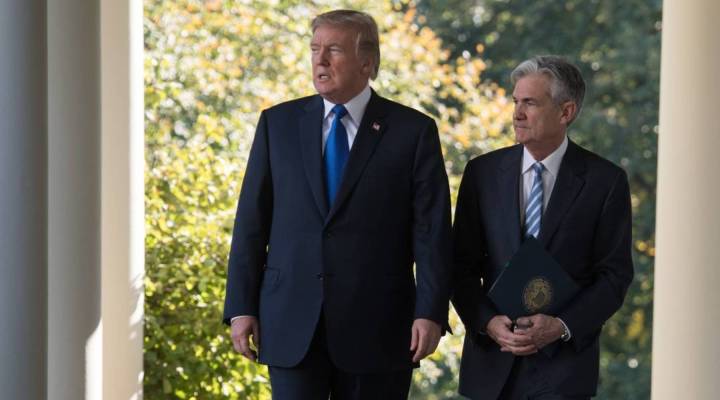
Trump’s Fed chair nominee is a lot like Yellen. So why replace her?
Trump’s Fed chair nominee is a lot like Yellen. So why replace her?

This afternoon President Donald Trump nominated Jerome Powell to succeed Janet Yellen as the chair of the Federal Reserve when Yellen’s term expires early next year. In a way, it’s a big change; Yellen is out a job as of next year, after all. But at the same time, as a governor of the central bank, Powell has never disagreed with Yellen’s direction. So what is going to change, if anything? Marketplace host Kai Ryssdal called up Ben White, the chief economic correspondent for Politico, to get a handle on what Powell’s nomination means for the future of the Fed. The following is an edited transcript of that conversation.
Kai Ryssdal: The president said very nice things about now-outgoing Chair Yellen; said she was a great person, did a great job. And yet, he’s replacing her. How come?
Ben White: Yeah, it was weird to hear him say, you know, she’s a fantastic person, done a terrific job, and yet I’m firing her. He’s replacing her because he likes to get rid of anybody who is a holdover from the Obama administration, wants to put his stamp on everything. You also had a problem on Capitol Hill. Republicans wanted to move on from Yellen and would not have been happy if she’d been reappointed. So he picked somebody who’s a little bit like Yellen, but is a Republican.
Ryssdal: Well, so let’s talk about the “a-little-bit-like-Yellen” thing about Jay Powell. First of all, not an economist by training, not that that’s necessarily incredibly relevant, but more to the point, his policies are going to be extremely similar. Where, then, are the differences, if any?
White: I think the difference will be, to a degree, in bank regulation. As we know, the Fed does both monetary policy and is the main regulator for some of the country’s biggest banks. Jay Powell, a little more friendly to deregulation, getting rid of some of the stuff that we put in place after the financial crisis. So he might differ from Yellen there. On monetary policy rate hikes, be very similar, never voted against her. So it will be gentle rate hikes over a long period of time. But he might be a little more friendly to Wall Street, and quicker to get rid of regulation.
Ryssdal: There are other vacancies that President Trump now has on the Board of Governors of the Fed, yeah?
White: Yeah. He’s got a vice chair to fill, and at least one other seat to fill, so he can really put a stamp on the central bank.
Ryssdal: Can we talk for a minute about the Federal Open Market Committee, which is distinct from Board of Governors? It’s the actual interest-rate-setting mechanism. Powell’s leadership on that committee, it’s not like he’s going to be able to come in and say, “I’m going to do it this way.”
White: That’s exactly right. The Fed operates by consensus. One of the reasons he went with Jay Powell is he’s known as a collegial guy who is a consensus builder, won’t ruffle a lot of feathers, and like Yellen and Ben Bernanke before her, will shepherd the FOMC along to mainly unanimous decisions. So you won’t see a lot of discord at the Fed. And that’s why he likes Jay Powell, in part because he is a consensus builder.
| Advice from the chairs: How to succeed at the Fed |
| What does the Fed chair actually do? |
Ryssdal: What’s the biggest challenge, before I let you go, that Jay Powell is going to have to deal with in the next four years, do you think?
White: Well, I think the biggest challenge for him will be if we hit another recession. We are long in the tooth in this expansion. Good chance that we get a recession over the next few years, and there’s not a lot of room for the Fed to act and counteract that. So what does he do if the economy slows down, unemployment starts to go up? We’re at really low rates already. Do we go below zero? Do we do more asset buying? He’s going to have a test when the economy slows down and the Fed doesn’t have a lot of ammunition at its disposal.
There’s a lot happening in the world. Through it all, Marketplace is here for you.
You rely on Marketplace to break down the world’s events and tell you how it affects you in a fact-based, approachable way. We rely on your financial support to keep making that possible.
Your donation today powers the independent journalism that you rely on. For just $5/month, you can help sustain Marketplace so we can keep reporting on the things that matter to you.












